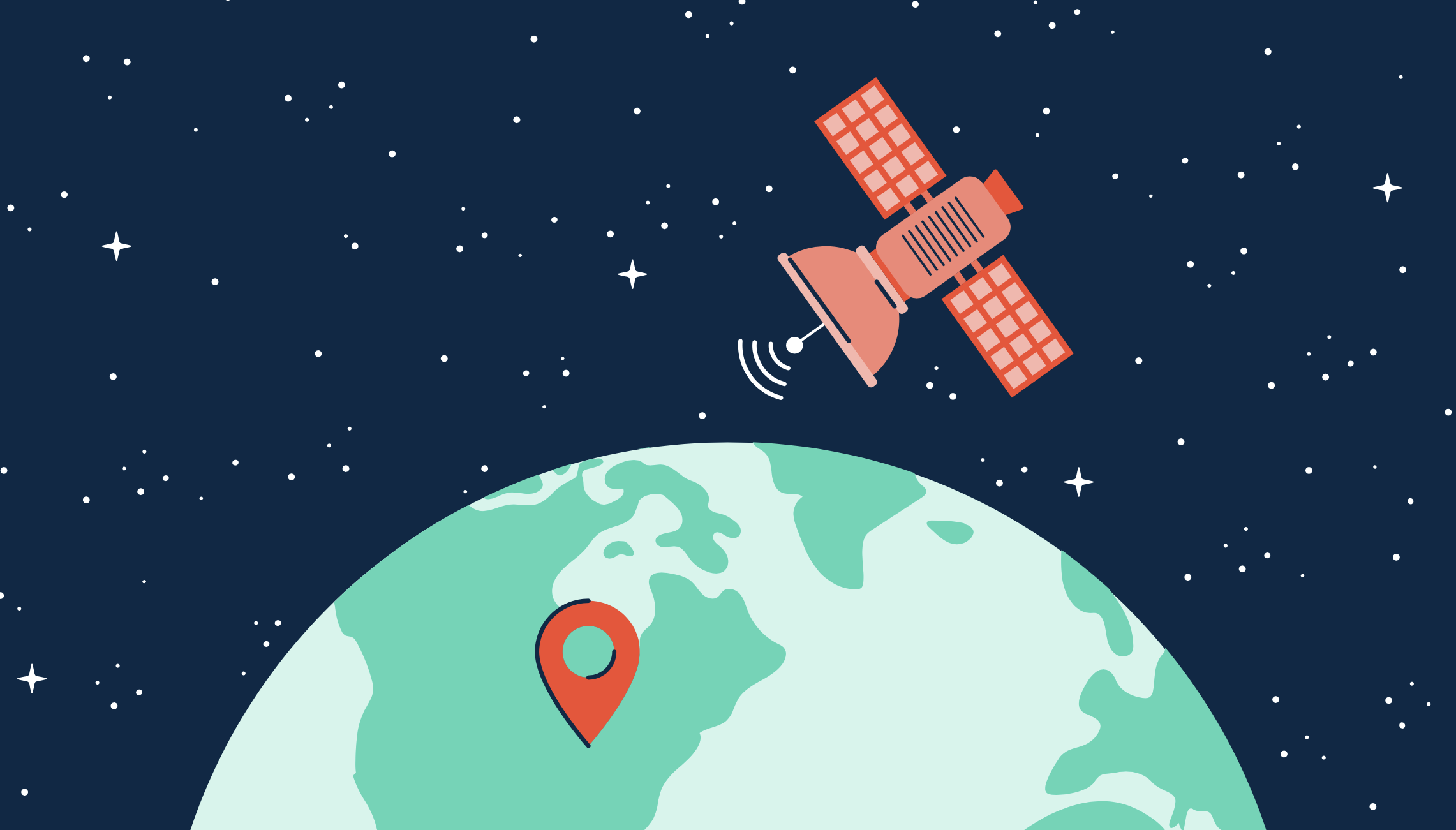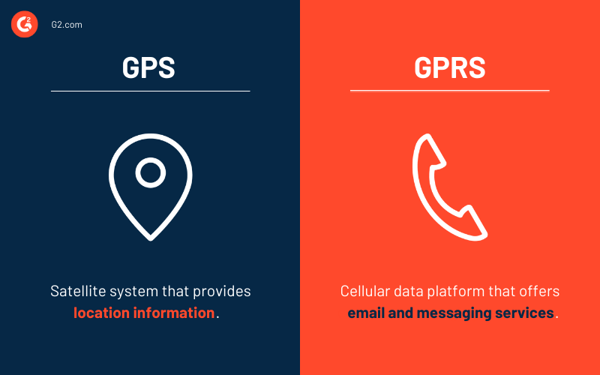March 31, 2022
 by Alexandra Vazquez / March 31, 2022
by Alexandra Vazquez / March 31, 2022

Keep right and take the exit toward your GPS guide.
GPS tracking helps companies take the “where?” out of their daily operations by keeping a close eye on their necessary items. It sends and receives satellite signals that determine the location of these items using geographic positioning.
GPS tracking is the process of using a navigation device to monitor the location of a person or object. In business, companies use it to track assets of value.
Businesses implement transportation management systems (TMS) to organize the transportation assets and valuables they monitor. TMS solutions can track fleets, manage air, sea, and rail shipping, supervise carrier relationships, observe shipping statuses, and offer more overall visibility into the shipping and procurement process. Transportation management systems are commonly integrated with supply chain suites to predict supply and demand needs.
The Global Positioning System (GPS) is a worldwide navigation system that locates specific points. A GPS tracking system connects to the Global Navigation Satellite System (GNSS) to collect data regarding location and direction.
GPS tracking devices work by sending out radio signals and connecting to those satellites to determine the location of a person or object using geographic positioning. Upon installation, a GPS tracking device immediately fetches that data and pings those satellites. The satellites identify a specific point’s location and its approximate distance using latitude and longitude.
GPS tracking is used both personally and professionally. The average user can track their car or pet. Companies can utilize GPS tracking to protect their business assets.
If a company wants to implement a compliant GPS tracking system, it has to keep two major things in mind:
Users apply GPS tracking in different ways. Some ways are more costly and tedious than others, but the payoff is a system that will never leave you frantically looking for something ever again.
People use many different types of GPS location tracking in many different ways. Those types fall into two major categories: personal and asset tracking.
Most people have encountered some kind of personal tracking. Personal GPS tracking allows a user to track the exact location of another person or object. People use personal GPS devices to track belongings or keep an eye on loved ones.
The most common use of real-time tracking for individuals is simply using a GPS to help them find the optimal route to their destination. However, there are other ways GPS trackers can be utilized for personal use.
For example, Apple’s Find My iPhone application allows users to track their Apple products. People who fasten trackers onto their dogs’ collars are also engaging in personal GPS tracking. Some even add GPS tags to their wallets or car keys.
Companies use asset tracking to monitor their physical assets of value. This includes computers, vehicles, office equipment, furniture, and machinery. Asset tracking locates any valuable that needs to be found.
Asset tracking works by giving hardware components unique identifiers that work alongside software to keep track of them. A typical example of asset tracking is warehousing companies that use GPS asset trackers to track their items and prevent theft. They may use radio frequency identification (RFID) tags or a barcode inventory system to track what they have and where.
The most popular use of asset tracking for companies is tracking a vehicle using cell-based and satellite-based GPS. Cell-based GPS vehicle tracking uses a device in the vehicle that sends location information by pinging nearby cell towers. Satellite-based GPS vehicle tracking collects location data through satellite networks.
Asset tracking software works with GPS tracking to pinpoint the “where” by providing a hub for tracking business assets. With these tools, companies manage asset registries, maintain an inventory history, and supply real-time location information.
Companies use three different types of tracking devices. These real-time GPS trackers, along with route optimization software, are primarily used in the fleet and transportation management process when tracking company vehicles. All three types are useful and have their own advantages and disadvantages depending on the company’s needs.
Plug-in GPS trackers are potentially the most simple trackers to install because they plug right into the electricity port inside a vehicle. They are usually small and easy to maintain. Because of the easy installation, this is the most popular tracker for people who hope to utilize it for personal tracking as well.
The major con of plug-in vehicle GPS trackers is that if the vehicle is turned off, the tracker goes offline. So in comparison to the other trackers available, the data is not as easily accessible at all times.
Hardwired GPS trackers are wired directly into the vehicle. This car GPS tracker is most favorable for businesses who may have company vehicles without the necessary electric port for plug-in trackers. They are relatively easy to install, can be hidden for security purposes, and remain permanent tracking fixtures to the specific vehicle.
The main disadvantage is that removing the hardwired tracker for maintenance is more difficult than the other GPS trackers. Similarly to plug-in trackers, the location data is also only available when the vehicle is turned on.
Battery-operated GPS trackers run on their own battery power as opposed to relying on the vehicle. With a powerful battery, these trackers can operate without maintenance for weeks or months at a time. There are even options for rechargeable batteries that could be more cost-effective in the long run.
The main con of battery-operated trackers is that they will most likely send out location data less frequently in order to save battery power. However, it will continue sending location notifications even when the vehicle is turned off.
There are many benefits to implementing a GPS tracking system into your operations process. Depending on the size of your business and the scope of your tracking system, these benefits could decrease costs and increase profits by prioritizing efficiency.
of GPS tracking users reported a positive ROI in fewer than six months in 2021.
Source: Verizon Connect
Although GPS tracking is extremely valuable in many ways, a company may encounter a few challenges as they start their tracking process and throughout its lifecycle.
GPS and GPRS (general packet radio service) are often confused because of how similar their acronyms are; however, they are very different in their uses and applications.

Global positioning system (GPS) is a satellite-based system that provides real-time location information. It is used for mapping out areas and navigating.
General packet radio service (GPRS) is a cellular data platform that provides information services. These services include accessing emails, media messaging, and video calling. It relies on network towers to operate successfully and relay mobile tracking data to an Android or iOS mobile device.
GPS and GPRS are similar in that they collect information and supply data to the user. They are both beneficial and used in many ways in daily life.
GPS and GPRS also differ in many ways. GPS can be used from anywhere, and the data it retrieves can be accessed at all times as well. GPS is so accessible that it is not limited to use on land and can be used at sea or even in the sky. It does this by connecting to the many available satellites in the area.
GPRS works within a limited area because it relies on cellular towers within range; it is exclusively used on land. GPS systems are traditionally much costlier than GPRS because they require the purchase, installation, and upkeep of an entire system. GPRS can be accessed from any mobile phone.
GPS tracking doesn’t just help you get to that place you’ve never been. Utilizing navigation technology in your business takes your operations to the next level.
Whether monitoring your valuables for protection or keeping an eye on your vehicles and drivers, GPS tracking will give you the insights you need. If all else fails, you can always reroute and take the next exit.
Curious how else you could keep an eye on your most important company assets? Learn more about inventory tracking and how you can upgrade your management system.
Alexandra Vazquez is a former Senior Content Marketing Specialist at G2. She received her Business Administration degree from Florida International University and is a published playwright. Alexandra's expertise lies in copywriting for the G2 Tea newsletter, interviewing experts in the Industry Insights blog and video series, and leading our internal thought leadership blog series, G2 Voices. In her spare time, she enjoys collecting board games, playing karaoke, and watching trashy reality TV.
On a busy Tuesday morning, the office printer jammed, causing a backlog of tasks and...
.png) by Devyani Mehta
by Devyani Mehta
Picture a world where digital and physical realities coexist seamlessly. You glance around...
.png) by Shreya Mattoo
by Shreya Mattoo
Pop quiz: what do today’s marketing teams and the Oakland Athletics from “Moneyball” have in...
 by Sidharth Yadav
by Sidharth Yadav
On a busy Tuesday morning, the office printer jammed, causing a backlog of tasks and...
.png) by Devyani Mehta
by Devyani Mehta
Picture a world where digital and physical realities coexist seamlessly. You glance around...
.png) by Shreya Mattoo
by Shreya Mattoo


